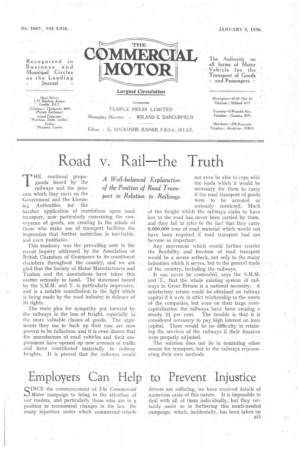Road v. Rail—the Truth
Page 21

If you've noticed an error in this article please click here to report it so we can fix it.
THE continual propaganda issued by the railways and the pressure which they exert on the Government and the Licensing Authorities for the harsher application Of restrictions upon road transport, now particularly concerning the conveyance of goods, are creating in the minds of those who make use of :transport facilities the impression that further restriction is inevitable, and even justifiable.
This tendency was the prevailing note in the recent inquiry addressed by the Association of British Chambers of Commerce to its constituent chambers throughout, the country'', and we are glad that the Society of Motor Manufacturers and Traders and 'the. assoCiations have taken this matter seriously in hand; •The. .statement issued' by the S.M.M. and T. is particularly impressive,: and is a notable contribution to the fight which is being made by the road industry in defence of its rights.
The .main plea for sympathy put forward by the railways is the loss of freight, especially in the more valuable classes of goods. The arguments they use to back up their. case are now ' proved to be fallacious, and it is even shown that, the manufacture of road vehicles and their employment have opened up new avenues of traffic and have .contributed materially, to railway freights. It is proved that the railways would • not even be able to cope with the loads which it would be 'necessary for them to carry if road transport of goods were to be arrested or seriously. restricted. Much of the freight which the railways claim to have lost to the road has never been carried by them, and they fail to refer to the fact that they carry R,000,000 tons of road material Which would not have been required if road transport had not become so important.
Any movemenC which would further restrict the flexibility and freedom of road transport would be a severe setback, not only to the many industries which it serves, but to the general trade of the country, including the railways. It can never be contended, says the S.M.M. and T., that the whole existing -system' of railways in Great Britain is a national necessity. A• satisfactory return could be obtained on. railway capital if it were in strict relationship to the assets of the companies, but even on their large overcapitalization the railways have been earning a steady 2i per cent. The trouble is that it is • considered necessary to pay high interest on loan capital. There would be no difficulty in retaining the services of the railways if their finances were properly adjusted. .
The solution does not lie in restricting other means for transport, but in the railways rejuvenating their own methods.




















































































